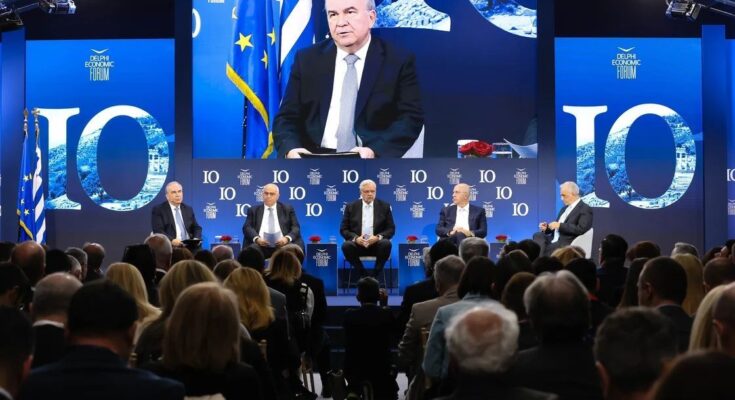
Nikos Papathanasis, Alternate Minister of National Economy and Finance; Nikolaos Karamouzis, Chairman, Grant Thornton; Christos Megalou, CEO, Piraeus Bank; and Spyros Theodoropoulos, Chairman of the Board, Hellenic Federation of Enterprises (SEV).
DELPHI, April 11 – Greece’s Public Investment Program (PIP) is set to exceed 17 billion euros in 2026, marking a new high in national investment planning, according to Alternate Minister of National Economy and Finance Nikos Papathanasis.
Speaking at the 10th Delphi Economic Forum during the panel “Why Does Greece Remain Underinvested, and What Would it Take to Spark an Investment Boom?”, Papathanasis highlighted that 2025 will see the largest public investment budget of the past 15 years – reaching 14.6 billion euros – followed by a further increase in 2026.
“We have created an investment environment that invites investors and generates positive news as a result of the government’s hard reform efforts,” said Papathanasis.
He underlined that Greece now ranks second among EU countries in absorbing funds from the NSRF (National Strategic Reference Framework) and seventh in absorbing Recovery and Resilience Facility (RRF) funds.
According to Papathanasis, in total, an estimated 8 to 8.5 billion euros from the RRF and NSRF will be allocated in 2025 and 2026, potentially leveraging up to 19 billion euros in investment.

Greek Alternate Minister of National Economy and Finance Nikos Papathanasis.
While progress has been made since 2019, the minister noted that much work remains – particularly in implementing investment programs and ensuring broader access to financing for Greek businesses. Key reform efforts include the simplification of licensing procedures and deeper collaboration with the private sector to accelerate project delivery.
Papathanasis also pointed to the potential of Greece’s domestic defense industry as a new investment frontier. “Development opportunities exist where we are able to strengthen domestic capabilities, such as in defense production,” he said.
Supporting this view, Hellenic Federation of Enterprises (SEV) Chairman Spyros Theodoropoulos described the aviation and defense sectors as “sleeping giants”, noting that more than 50 Greek companies already operate in this space. He called for renewed cooperation between Greek and European firms and suggested reinstating a law that required 30 percent of defense spending to generate domestic value.
The broader investment discussion included perspectives from the banking sector. Piraeus Bank CEO Christos Megalou noted that Greek banks, particularly his own, financed the economy more than any other year in 2023. He highlighted strong credit growth and praised the RRF loan tool for its investment leverage potential.

Grant Thornton Chairman Nikolaos Karamouzis.
Grant Thornton Chairman Nikos Karamouzis added that despite recent progress, Greece continues to face structural challenges – including limited competitiveness among small businesses and an aging population.
He outlined ten areas requiring intervention to sustain long-term investment growth, among them public administration reform, infrastructure upgrades, and demographic policy.
Still, Papathanasis remained optimistic: “Greek businesses have learned to operate amid crisis. The current climate should be met with composure, patience, and a rational approach to executing investment plans.”
The 10th Delphi Economic Forum opened on Wednesday, April 9, in Delphi, Greece. Held under the theme “Realignments”, the forum brings together global leaders, policymakers, and analysts to explore pressing issues including geopolitical shifts, energy security, innovation, and sustainability. The event runs through April 12.
Follow GTP Headlines on Google News to keep up to date with all the latest on tourism and travel in Greece.
Source link



